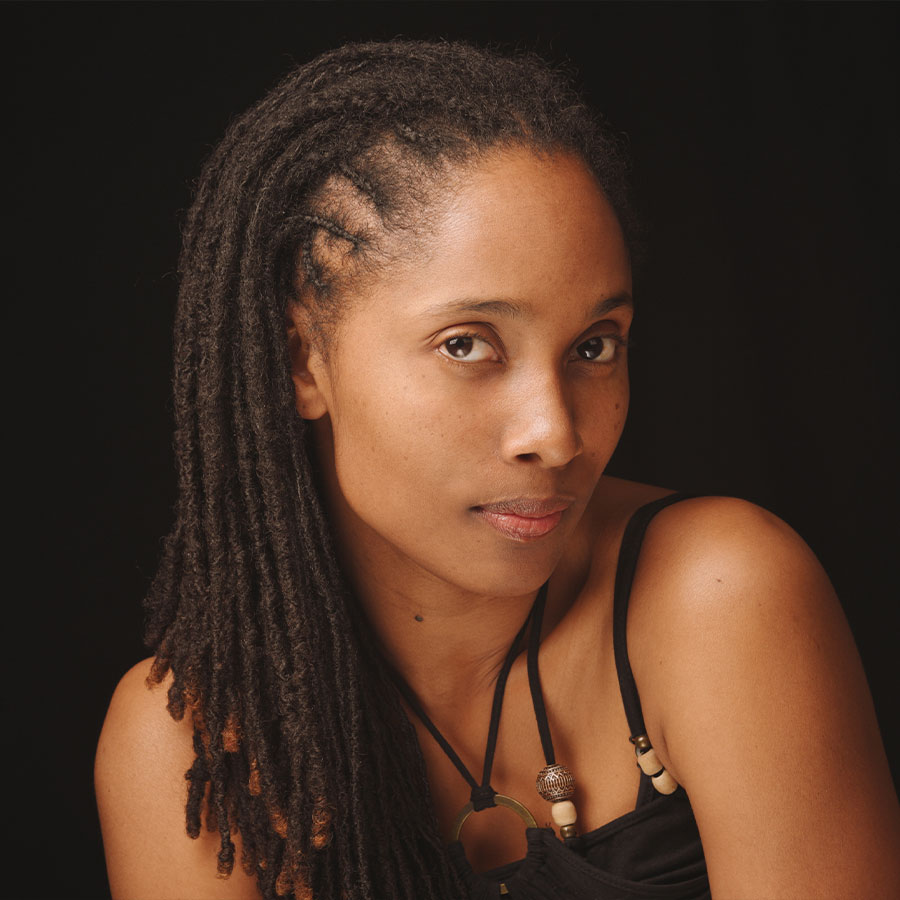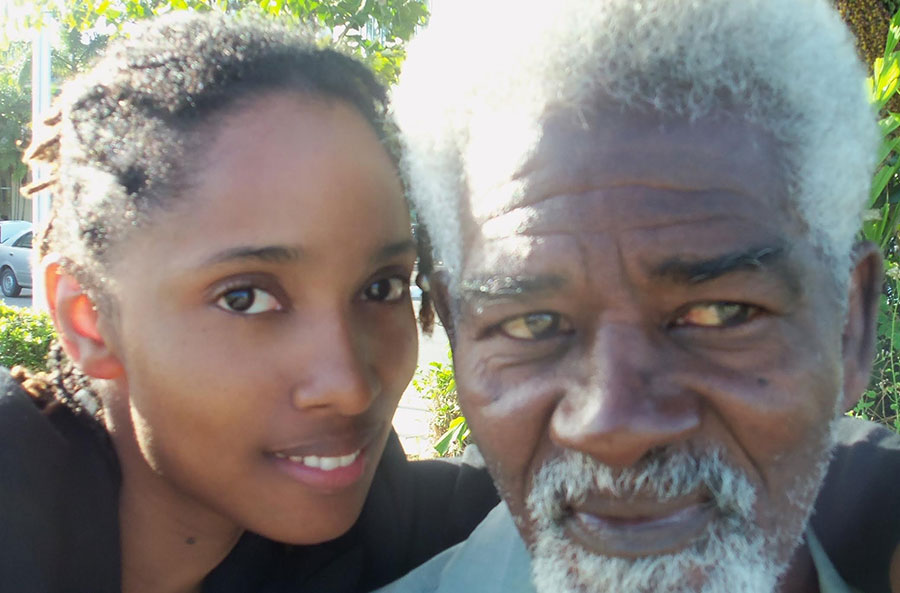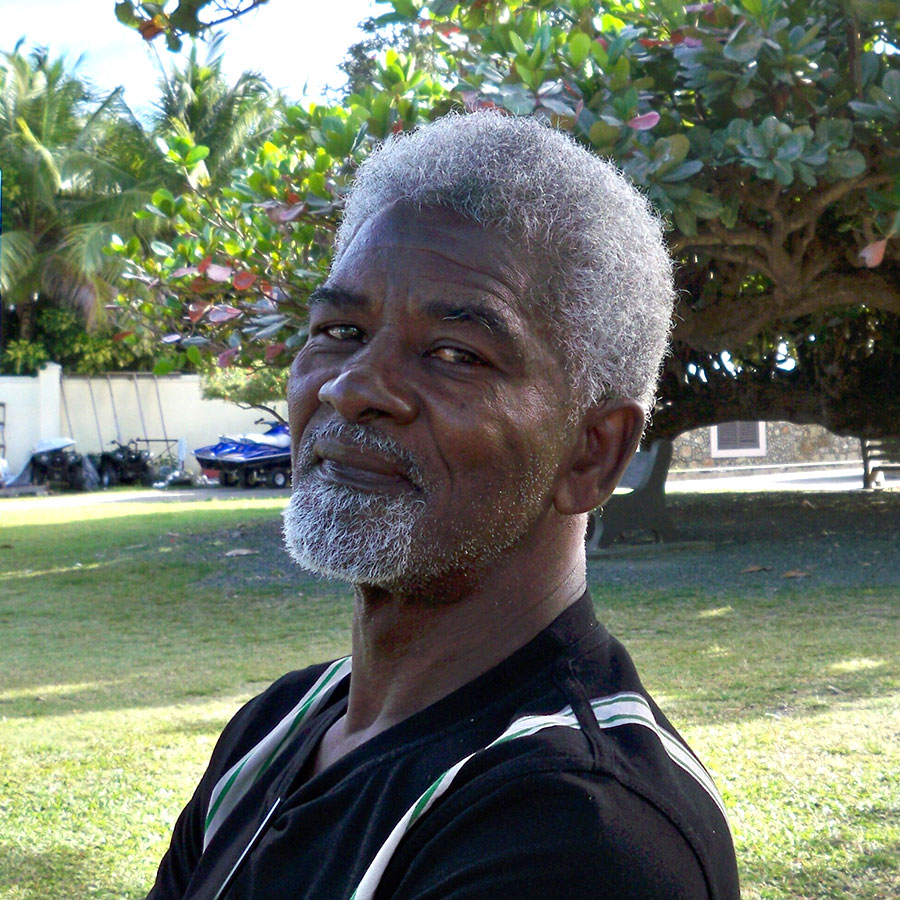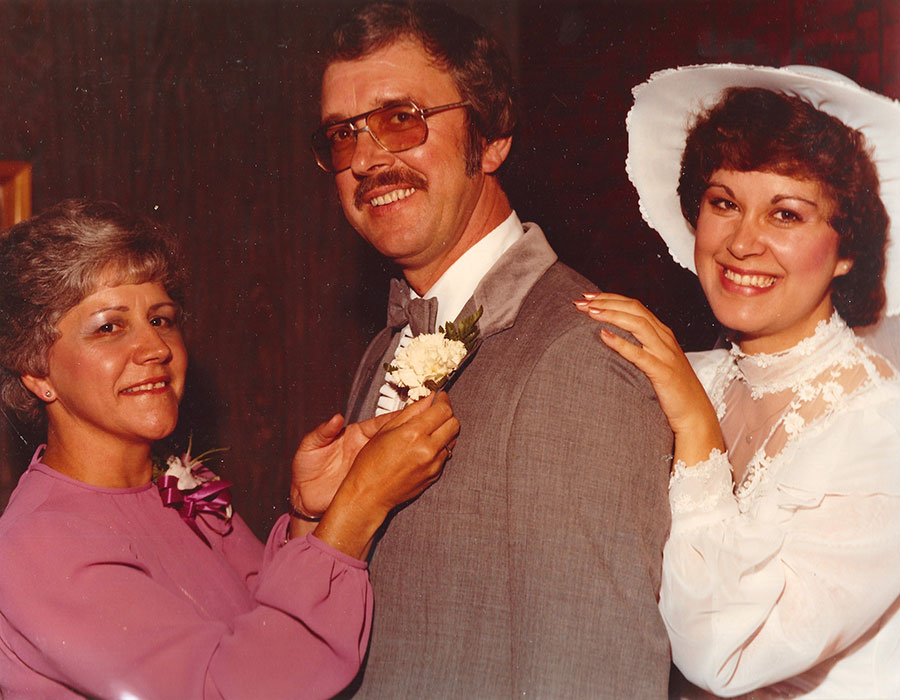Finding “Humanity in Music”: How a Toronto Musician Is Honouring Her Father’s Battle With Alzheimer’s Disease

Toronto jazz singer Jasmin Uglow, pictured above, is honouring her late father, Ralph Beckles, and his battle with Alzheimer's disease with a pair of projects that reflect their shared love of music while supporting others facing the disease. Photo: Exposures Photography
For Toronto musician Jasmin Uglow, the memories she has of her late father, Ralph Beckles, are inextricably connected with her music.
The 45-year-old jazz singer, who became her dad’s caregiver after he suffered a massive stroke and developed Alzheimer’s disease at age 74, still pictures her father, a trumpet player from Trinidad and Tobago, standing in the door of her home recording studio as she laid down her latest tracks.
“My dad would show up at the door, just to listen,” she recalls. “You could see the proud look on his face, but he wouldn’t come in. He’d show up just to make sure I knew he was there.”
It’s the same studio where, just a year before his stroke in 2018, she recorded her father’s vocals for the first time during one of his Toronto visits.
“I don’t know why I had this premonition, but I said to him, ‘I want to have your voice on something,’” Uglow recalls of the hasty recording made just before he left on his flight back home. “I didn’t know what I was going to tell him to sing, but, because I’m a writer, it just came to mind: ‘I am my father’s child.’”
“It’s amazing that it was just a year before he wasn’t able to sing anymore,” she adds.

Uglow’s musical connection with her father didn’t end there. When she was faced with the challenge of getting him out of bed and ready for the day, his favourite jazz songs would often elevate his mood, while classical music, which they shared a love for, would calm him. However, it was the difficulties of watching the father she knew slip away that saw her music take on what she calls a “higher purpose.”
“I started writing everything,” she says. “I wrote about our experiences together, the emotional part of it and the hopeful part of it as well. That was like a therapy for me.”
That therapeutic process resulted in Remember Me, an album chronicling her experience with her father, released on Spotify with proceeds benefiting the Alzheimer’s Society. The 10-track album sees Uglow open up about some of the more painful moments from the year and a half she cared for her father, including “You Forgot,” born out of the moment she realized her father no longer knew who she was. In another song, “I’m Here,” she tells her father “You don’t need to know my name, I love you.” Last, but certainly not least is “My Father’s Child,” in which Jasmin sings along with her father’s final recording in the chorus — a song she plans to release as a bonus track.
Now, with the album racking up streams, Uglow is building on its momentum with the launch of Humanity in Music, an annual nationwide virtual fundraising music festival that brings Canadian artists together to raise money for the organization.
“It’s my way of giving back and, in a way, validating the experience that him and I went through wasn’t in vein,” she says of the non-profit, which holds its first concert on World Alzheimer’s Day (Sept. 21). “After going through that ordeal, I now feel like my music should have a higher purpose. Writing the album taught me that.”
Tickets for the Humanity in Music virtual concert, which begins at 6:00 p.m. EDT on Sept. 21, are currently on sale for $20.
Paying It Back
Uglow’s choice of the Alzheimer’s Society as her beneficiary stems from her personal connection with the non-profit. After her father suffered a stroke in his home country of Trinidad, Uglow was hampered by the limited resources the country’s healthcare system offered, both in and out of hospital. Still unable to sit up, he was discharged and she was told he would die within a week. Two months after the stroke, he was diagnosed with Alzheimer’s. After feeding him with a feeding tube and guiding him through daily exercises for six months, he was strong enough to sit up in a wheelchair and take a flight back to Toronto. Still, the difficulties of caregiving were magnified for Uglow. Not only was she responsible for all of his medical bills but, because he wasn’t a citizen of Canada, she was legally required to fly him back to Trinidad every six months.
“I was so tired and depressed,” she says. “I went online to see what I could find out about Alzheimer’s and came across the Alzheimer Society’s website.”
After responding in a section asking her to share her story, she says the response was immediate.
“The Alzheimer’s Society was the only organization that helped me prepare for what we were going through together,” Uglow says. “It was a mental journey for both of us and the Alzheimer’s Society saved me from falling into a big hole. They were there for me when I needed to talk to somebody.”
The non-profit, which aims to “alleviate the personal and social consequences of Alzheimer’s and promote causes, treatments and a cure,” provided Uglow with everything from counselling and education on Alzheimer’s to funding for his personal care.
Uglow says the Humanity in Music event is her attempt to pay some of that support back, while at the same time creating something positive out of her and her father’s experience.
“The whole thing is quite emotional because I feel like I’m honouring my father, the people who have gone through Alzheimer’s and giving back to the organization that was the biggest help to me,” she says.

Alzheimer’s disease, which involves a progressive loss of memory and can leave individuals unable to communicate or respond to the environment or carry out daily activities, is the most common form of dementia. Currently, more than 747,000 Canadians are living with Alzheimer’s or another dementia and more than 55 million people are living with dementia worldwide. With the population aging, the World Health Organization projects that the number of sufferers will rise to 78 million by 2030.
Sharing the Cause
Uglow says everyone involved with the event shares some kind of connection with the cause.
Lois O’Hanley-Jones, 63, Patty Dunlop, 62, and Debbie Rivard, 64, members of the Blind River, Ont., folk-country trio Women in Song, will open the event with their music video for “But I Knew Her When,” a song they wrote as Dunlop’s mother was in the final stages of Alzheimer’s — an ordeal that Jones is now facing with her own mother.
As the title suggests, the song honours their mothers as they knew them before Alzheimer’s, but also articulates the complex grieving that takes place while watching a loved one progress through the disease.
“The song always reminds me of our mother’s love and how unfair Alzheimer’s disease is,” Jones says. “Patty has always said, you lose that person before they actually die.”
Reflecting on the songs lyrics — which describe a woman who lived every moment and followed her dreams — Dunlop and Jones can see how they were influenced by the way their mothers lived.
Dunlop remembers her mother, Jeannette Forest, as a woman that was all about family, but also managed to fit in a career and social life between raising kids.
“She had a great social life; she curled, they loved to go snow machining, they had a cottage, they did all that stuff,” Dunlop says. “She was really smart and she raised me to be pretty independent too.”

Meanwhile, Jones’ mother, Rita O’Hanley, who was raised in an Acadian community in Chéticamp, N.S., uprooted herself for a life in Ontario — a bold move that involved breaking off a marriage engagement and learning English.
“She was just the toughest, strongest, free bird that I knew, [which] she instilled in me,” Jones says. “And I’m grateful for that to this day.”
That “seize the day” mentality is something that permeates the group, which first sang together at a bake sale fundraiser for their kids’ school. Now, 20 years later, with each of them in their 60s, they’ve released their first album, Life of a Woman, which the group describes as an ”homage to women” and a reflection of their own lives.
“For us to realize this dream in our 60s, it’s a rare kind of thing,” Jones says of the album, which they completed during the pandemic. “Usually younger bands take up this sort of thing but, for us in our 60s, it’s a dream come true. And it shows you that it’s never too late to take something off your bucket list.”
Music as Therapy
Dunlop and Jones both understand the influence music can have on those battling Alzheimer’s.
“My mother was always very musical,” Jones says. “Even though she doesn’t know my name now, when I play music she loves it.”
“It’s like she didn’t know who I was, but if I sang to her, her face lit up,” Dunlop adds. “Music just does so much good in so many different ways.”
Meanwhile, Uglow says she’s seen her father use music as a coping mechanism on his own. Accompanying him on a flight back to Trinidad, she remembers how her father soothed himself with a favourite hymn during a stressful patch of turbulence.
“In the midst of all the fears and the kid screaming in the back, my dad started to sing,” she recalls. “He couldn’t speak nor could he pronounce any words clearly, but he sang so loud. I was embarrassed as hell, but what I realized was that the child in the back stopped screaming, everybody stood silent, and he went on like this for, like, 10 minutes. It was just like it calmed the whole flight.”
The influence of music on people with Alzheimer’s isn’t just anecdotal. Music therapy, which involves the clinical use of music to treat mental health issues like anxiety and depression, has had success producing positive outcomes for people with Alzheimer’s and other dementias. A 2020 review from Frontiers in Medicine of eight studies on the effects of music therapy on dementia found that the intervention improved cognitive function and quality of life in patients, including improvements in those suffering from long-term depression.
Dorothy Davies, an accredited music therapist and founder of Cornerstone Music Therapy, who has treated clients with Alzheimer’s and dementia both in and out of long-term care settings, has seen how her work can help patients reconnect with family.
“When you bring in a music therapist, all of a sudden part of who they were, or who they are now, comes out again and they’re able to interact and engage,” she says. “It can be hard for caregivers and family members to process that the person that they’re interacting with now is very different. When family members are able to sit in on a music therapy session and see that connection again, it means a lot.”
However, Davies’ sessions, which can involve singing, playing an instrument, listening to or even composing music, primarily focus on the client’s individual needs. For some Alzheimer’s patients, simply engaging them in an activity is the goal.
“One challenge that many people may find is that patients don’t want to get out of bed, or they just don’t want to do anything other than watch TV, or they’re just falling asleep,” she explains. “So even just having that willingness to want to go do something is an improvement.”
For others, the goal is pointing them back to the “here and now so they can process the feelings they’re going through,” she explains.
In her group programs, which she often runs in long-term care homes, facilitating social interaction with the music is her aim.
“It’s really meaningful to them just having that social aspect, which oftentimes reduces anxiety, loneliness, depression — which you also see a lot of patients with Alzheimer’s struggling with,” she explains.
Music Therapy at Home
While music is a powerful tool, Davies says tapping into its benefits isn’t as simple as playing a client’s favourite tune.
“People don’t realize that music can be harmful,” she says. “For example, it might overstimulate the patient — and they may have no way of saying it, whether it be because nobody’s around or because they’ve lost that ability to communicate.”
Davies says triggering the wrong memory with a particular song can end up causing harm as well.
“It can bring up traumatic memories for them,” she explains. “Sometimes they can end up crying or being really stressed and anxious about something because of a certain song.”
Instead, Davies encourages a more intentional approach to using music which, for her, involves assessing someone’s mood and needs before she even plays any music.
“Every time I go into a session, I need to assess what is going on with the client, whether or not they’re feeling very receptive, happy, sad, agitated, whatever it is because the music that I bring in and what I do in that session is really determined by what they need from me at that moment,” she says.
For caregivers hoping to take a more mindful approach, she recommends matching the music with the person’s mood and making sure they personalize the music to their tastes.
But, again, Davies cautions that music isn’t always what they need — even in a music therapy session.
“Maybe they’re feeling really lost that day and they have no idea what’s going on, maybe they’re really missing their family member, maybe they’re really frustrated and they’re just looking for someone to talk to,” she says. “It’s really assessing before prescribing what you’re going to do that day.”
RELATED:
How Music Therapy Is Making a Difference for Patients in Palliative Care
Good Vibrations: Could Doctors Prescribe Music Like a Drug?
What Types of Memories Are Forgotten in Alzheimer’s Disease?